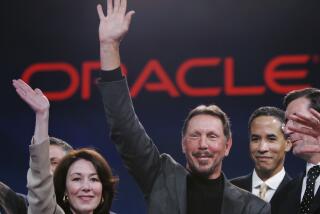IBM to Replace Chief Executive, Slash Dividend
- Share via
International Business Machines Corp., reeling from a disastrous two-year slump and facing intense criticism from investors, said Tuesday that John F. Akers would step down as chief executive of the world’s biggest computer maker as soon as a successor is found.
IBM also said Tuesday that for the first time it would cut its shareholder dividend--more than halving it to an annual rate of $2.16, from $4.84, a move that will save billions of dollars. The dividend cut, which was expected, brought a tepid reaction from Wall Street. IBM shares rallied early in the day but fell back to $49, up 12.5 cents a share, in New York Stock Exchange trading.
The announcement left some key questions unanswered, namely whether Akers will stay on as chairman and whether the new chief executive will come from inside or outside the company. An outsider has never been named to run IBM in its 79-year-history.
Akers has led IBM during the company’s most difficult period ever. Although he has overseen a deep reorganization, cutting 100,000 jobs, closing plants and breaking the company into 13 semi-autonomous units, critics said he simply didn’t act fast enough. IBM has lost $7.8 billion and half of its stock market value in the last two years.
In the process, Akers has come to symbolize a chief executive who was unable--or unwilling--to bring about the kind of radical change needed to turn around a huge, stumbling corporation. Top management of struggling megacorporations such as IBM and General Motors have been criticized for becoming entrenched and ineffective.
Critics say that only a strong outsider--one who isn’t afraid to fire people and possibly sell or spin off big chunks of the business--can restore IBM to profitability.
Tuesday’s announcement, which came during a two-day meeting of the company’s board of directors, was welcomed by industry analysts as a necessary step in turning around the giant computer company. But they cautioned that Akers’ departure alone would do little to resolve the company’s profound problems.
Most analysts strongly prefer an outsider to replace Akers as CEO, but IBM said current employees will be considered as well.
IBM said a search committee of outside directors, led by former Johnson & Johnson Chairman James E. Burke, hopes to name a new CEO within 90 days. Rob Wilson, an IBM spokesman, said no decision had yet been made on whether Akers would keep the chairman’s post or whether that position would be separate from the CEO job.
Akers, who was appointed chief executive in 1985 and chairman a year later, said in a statement that he was quitting voluntarily. “It is the right time in IBM’s business transformation to identify new leadership,” he said, reiterating his belief that changes made during the last year have put the company “on the right path.”
The IBM chief said just last month that he had the board’s full support and would not resign.
But if Akers hadn’t jumped, he might have been pushed. Calls for his ouster have been growing louder since the company announced a major restructuring in December and reached a crescendo last week after IBM announced a $4.96-billion loss for 1992, the biggest loss in U.S. corporate history. Institutional investors and shareholder-advocate groups, who played a central role in forcing recent management changes at General Motors and American Express, were threatening to force a shareholder vote on proposals to give outside directors more power.
Still, few expected Akers’ departure to come so quickly. And fewer still anticipated the other management changes announced Tuesday: the resignation of President Jack D. Kuehler, who will become board vice chairman, and the retirement of Frank Metz, senior vice president for finance. Metz’s post will be assumed by Paul J. Rizzo, a one-time rival of Akers’ who was called out of retirement last month to help the company out of its crisis.
Neither Akers nor IBM directors would comment Tuesday.
Many analysts assume the changes were engineered by Burke and several other outside directors--notably Thomas S. Murphy, chairman of Capital Cities/ABC, Stephen D. Bechtel Jr., chairman emeritus of Bechtel Group, and J. Richard Munro, former co-chairman of Time-Warner.
But some sources say former IBM chairman Thomas Watson, a legendary figure in the company’s history, played a key role in the shake-up. And Bob Djurdjevic, a former IBM manager and president of Annex Research in Phoenix, says that former chairmen Frank Cary and John R. Opel--the latter being head of the board’s executive committee--were behind the changes.
Whoever is tapped for the CEO job--and the names bandied about Tuesday ranged from former Chrysler Chairman Lee A. Iacocca to Intel CEO Andrew S. Grove to several lesser-known managers at Hewlett-Packard--will face an awesome challenge. After dominating the computer business for decades and establishing itself as the most profitable company in the world, IBM was blindsided by a series of technological and structural changes that turned the industry upside down.
Corporate computer managers who were once virtually obliged to buy big, expensive mainframe computers from IBM can now opt for cheaper, standardized personal computers and workstations, sold by dozens of companies. IBM has lost control of PC design to Intel and Microsoft, and the emergence of highly standardized PC technologies has opened the door to a slew of nimble, highly focused companies that compete with IBM in every segment of its business.
To IBM’s critics, only an outsider will have a chance.
“It’s imperative that they get someone who comes from a different (culture), who is capable of doing painful things in a forceful way,” said Charles Ferguson, an influential consultant who recently co-authored an “open letter” to IBM’s board calling for Akers’ ouster. “But this is not going to fix IBM’s problems; they have very serious, long-term problems.”
Richard Shaffer, publisher of the Computer Letter, cautioned: “Don’t hope for big changes quickly. It’s symbolic and it will probably boost morale, but if IBM has a management problem, it’s not just Mr. Akers. There are dozens of other managers. . . . They’ve already taken many of the right steps, but much later than they should have.”
RELATED STORIES: D1
More to Read
Inside the business of entertainment
The Wide Shot brings you news, analysis and insights on everything from streaming wars to production — and what it all means for the future.
You may occasionally receive promotional content from the Los Angeles Times.










